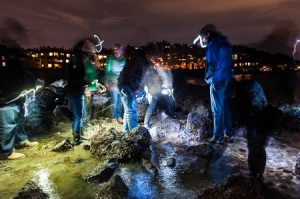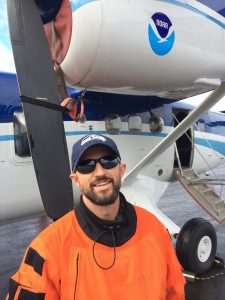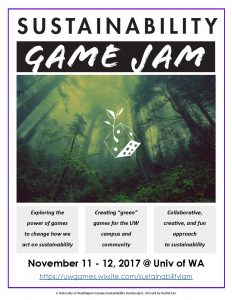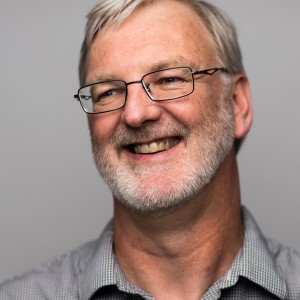SAFS Bevan Speaker Series (1/25): Dr. Éva Plagányi: “Caught in the Middle: Sustaining Fisheries in a Changing Climate”
In a world of changing climate and increasing human population size, fisheries are caught between the pressures of changing climatic influences on productivity and distribution and increasing market demand. Sustaining marine fisheries in the face of these two global drivers of change increasingly calls for Global Approaches to Fisheries. Whilst a stretch from current approaches, there are several modelling and related tools that can be developed and used to address the increasing complexity and global connectedness of fisheries systems as well as account for changing targets and baselines.
Read moreBevan Series (SAFS weekly seminar): Truth-telling in the Salish Sea: The Black Art of Communicating Climate Change
I will discuss the essential link between a free press, and free scientific inquiry. In a world of fake news, how do scientists, and journalists get the truth out to the public and policy makers that need to hear it, in ways they will listen? What is the unique contribution that science has to make to the public policy debate? How do scientists get their data beyond the realm of technical papers and the academy to the public realm where it can make a difference – without tarting up, compromising or dumbing down the findings? How do reporters communicate science to a lay audience that may be unfamiliar to – and not even necessarily open to – what science has to say? Truth Telling in the Salish Sea is talk not only about the how-to of effective science communication, but why it is so critical.
Read moreStep up your job search game by attending the 2018 UW Environmental Career Fair!

Join us for the annual Environmental Career Fair on Wednesday, February 21, 2018 from 11:00 am to 2:00 pm in the Mary Gates Hall Commons. Read on for more information about workshops, and a list of participating organizations. This event is free and open to the public.
Read more[SAFS Bevan Series]: “Fish and Fisheries in Hot Water: (How) Do We Adapt?”

This year promises to be hot as we explore the effect of a changing climate on fishery sustainability. What effect does a 3+ year marine heatwave have on North Pacific fisheries? How does acidification affect shellfish and finish sustainability? Who wins, and who loses, in the political wars to determine who can fish what where? Can our own U.S. congress reauthorize our Fishery Management Act without major (untoward) alterations? And how can we, as scientists and citizens, communicate our expertise and opinions on all of these issues?
Read moreThe Bevan Series: weekly guest lectures at SAFS in winter

The Bevan Series is a popular annual event held one quarter each year, usually in the format of weekly seminars for 10 weeks, and on occasion as a two-day symposium. The series features internationally recognized experts seeking to examine current issues affecting fisheries and marine conservation, representing as many viewpoints as possible, focusing on solutions to pressing problems. All lectures are free and open to the public.
Join us for the first SAFS lecture today (Thursday, January 4) at 4:30 pm in FSH 102 Auditorium
speaker: Professor Ray Hillborn, Aquatic & Fishery Sciences, University of Washington
talk: Is U.S. Fisheries Policy Working? Getting the Message to Congress
[event]: Seattle Aquarium Nighttime Beach Walks (Alki Beach, Seattle, 12/2, 1/28)

Encounter low tide at night on South Alki Beach, with the help of the Seattle Aquarium Beach Naturalists. These evening events (12/2 and 1/28) are free and open to the public!
Read more[seminar]: Modeling the Distribution and Abundance of Ice-Associated Seals in the Arctic

Modeling the Distribution and Abundance of Ice-Associated Seals in the Arctic
Paul B. Conn
Research Statistician
Marine Mammal Laboratory, NOAA Alaska Fisheries Science Center, Seattle, WA, USA
Affiliate Associate Professor
School of Environmental and Forest Sciences, University of Washington, Seattle, WA, USA
Thursday, November 2, 2017 4:00 PM
Fishery Sciences Building, Room 102
info session for undergraduate academic programs related to marine & aquatic sciences hosted upstairs in FSH 203 from 3:00 – 4:00 pm
Abstract: Negative trends in seasonal Arctic sea-ice extent have prompted concern for the viability of ice-associated marine mammals.
Sustainability Game Jam (11/11-12)

Passionate about the environment? Like games and want to try making one? The Sustainability Game Jam Nov 11-12 is for you! What’s a game jam? It’s a weekend event where participants design a game around a theme – this jam will focus on creating games (using any format) that educate, inform, and promote sustainability.
Read moreMarine and Aquatic Sciences Info Session

Join the academic advisers for Aquatic & Fishery Sciences, Oceanography and Marine Biology for an informational session about courses, majors and minors related to marine and aquatic science. This includes the study of life in all aquatic environments, ocean engineering, conservation of marine resources, and impacts of global climate change. Light refreshments will be provided.
Read more[seminar]: Monitoring population changes in aquatic ecosystems: a Marine Renewable Energy example

Monitoring population changes in aquatic ecosystems: a Marine Renewable Energy example
John Horne
Professor, School of Aquatic and Fishery Sciences
University of Washington, WA, USA
Thursday, October 26, 2017 4:00 PM
Fishery Sciences Building, Room 102
no open advising this week; e-mail marbiol@uw.edu to schedule an appointment
Abstract: Establishing procedures to identify, characterize, and forecast biological change is an ongoing challenge for both regulators and developers of marine renewable energy (MRE) projects and environmental monitoring in general.
Read more